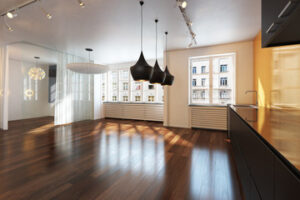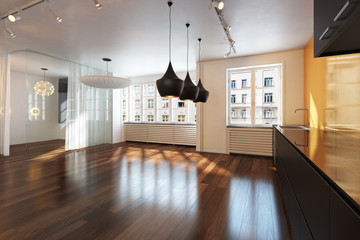Precision Hardwood Flooring LLC is a timeless and durable choice that will elevate the style of your home. It’s versatile, easy to maintain, and environmentally friendly.
Solid hardwoods come in a wide variety of hues and grains, making it easy to coordinate them with your decor. Some popular species include oak, maple, hickory, ash, and walnut.
Hardwood is a great choice for floors because it’s naturally durable. However, the durability of your wood floors depends on how well they are maintained. For example, if your floors aren’t protected from moisture, they’ll be vulnerable to damage. Water and humidity can cause warping, cracking, squeaking, and buckling in hardwood floors.
The type of wood used to make your hardwood floors also impacts their durability. Harder woods like oak, maple, and hickory are more resistant to scratches, dents, and other abrasions. Softer woods like pine, fir, and cedar are more susceptible to these damages.
The Janka rating of a species of wood helps to give an idea of how durable it will be. This is determined by measuring the amount of force it takes to push a.444 steel ball halfway into the wood. When you choose a solid hardwood, make sure to select one with a high Janka score for maximum durability.
Easy Maintenance
Unlike carpeting, which can trap dust and pet dander, hardwood floors can be quickly swept or vacuumed to remove impurities. They can also be wiped down with a damp mop to keep them clean. They are also more stain resistant than other flooring materials and can be refinished to buff out scratches and dents.
While wood is not as plush and soundless as carpeting, it can be made to feel comfortable with proper insulation techniques. In addition, it is known to reduce noise in the home by softening footsteps and absorbing sound.
Increased Home Value
One of the most common considerations homeowners have when deciding on flooring options is how it will impact their home’s value. Depending on the wood type, installation costs, and long-term maintenance needs, hardwood can add significant value to a property.
Real estate studies show that homes with hardwood floors often sell faster and for a higher price than those without. As such, this makes them a great investment for homeowners.
Whether you’re looking to upgrade your entire house or just a single room, the right design can make a big difference. The pattern and direction of the planks of hardwood can greatly influence how your house looks, so consult with a professional to find out what options would work best for you. You can even consider using reclaimed timber for your hardwood floors for an added rustic appeal. This can give your home a unique look that will stand out in the market.
Increased Value of Your Home
Hardwood floors are a natural design feature that can increase your home’s value. They create a clean and sophisticated look that is appealing to most prospective buyers. In addition, they can help reduce dust and allergens in your home, making them an attractive feature for people with allergies.
Homes with hardwood floors spend less time on the market, which helps recoup the initial investment and improves your chances of selling quickly. This is important because potential buyers are often willing to pay more for a move-in-ready home.
The type of hardwood you choose is also an important factor. Oak and maple are popular options for traditional or domestic styles, while exotic woods like mahogany add a unique and luxurious style. You can also opt for engineered or sustainable options that align with your environmental values and fit your budget.
Increased Resale Value
In addition to the durability and timeless appeal that hardwood floors provide, they can also add value to your home. This is especially true if your floors are well-maintained and free from scratches, dullness, and other signs of wear. In many cases, homeowners find that their homes sell faster and at a higher price when they have beautiful hardwood floors.
Wood flooring is also a sustainable option for homeowners who are concerned about the environmental impact of their purchases. Because wood comes from a renewable resource, it can be reclaimed and reused after its use is finished, reducing waste and pollution.
Hardwood floors are a versatile feature that can blend with many different design styles, making them attractive to a wide range of potential buyers. However, the initial cost of installing hardwood floors may be higher than other types of flooring. Professional installation can help ensure a durable finish and a good return on investment when it comes time to sell your home.
Natural Aesthetics
Hardwood floors are timeless and add a sense of elegance to any space. They are a natural fit for many different decor styles, from contemporary and minimalist to rustic and traditional. In fact, a wide array of hardwood floor colors and textures are available today, so it’s easy to find something that suits your unique aesthetic preferences.
Moreover, many manufacturers offer distressed and hand-scraped options that hide scratches and wear for an appealing timeworn look. Natural wood also reflects light better than many other flooring types, making them ideal for rooms with ample sunlight.
Choosing the right hardwood species and finish is critical to the longevity of your floors. If you have heavy foot traffic, choose durable hardwoods like oak or hickory that resist scratching and damage. Lighter woods like maple or cherry are a good option for rooms with less traffic.
Reduced Noise
Hardwood floors can reduce the amount of noise that travels between rooms. They also absorb sound, helping to create a more comfortable environment for your family and guests.
This is especially important if you live in an open-concept living space. Sound tends to bounce around the space and can cause an echo or reverberation in the room. However, hardwoods are able to absorb the sounds of footsteps and conversations. This will help to minimize the noise and make it easier for people to carry on a conversation or listen to music.
For a more dramatic sound reduction, you can add a layer of underlayment to your new wood flooring. Adding a layer of cork, foam or shredded rubber under your floor will help to reduce the sounds that move between the subfloor and the floorboards. This can also limit squeaking from nails or screws rubbing against the plywood under your floors.
Reduced Allergens
Allergies are a common and annoying health problem that affects millions of individuals around the world. They can cause a variety of symptoms, including sneezing, runny nose, itchy eyes, and asthma attacks. One of the key factors in alleviating allergy symptoms is creating a healthy home environment that minimizes allergens.
Hardwood floors are a great option for allergy sufferers as they provide a smooth surface that is difficult for allergens to collect, unlike carpeted surfaces. Regular sweeping, mopping, and vacuuming can effectively remove dust, pollen, pet dander, mold, and mildew from your hardwood floors, helping to improve indoor air quality.
Be sure to choose low-VOC sealants and finishes for your wood flooring to minimize chemical emissions that can trigger respiratory irritation. This can be especially important if you have children or elderly people living in your home. Look for third-party certifications of low-VOC content to ensure the product you are choosing is a safe choice.
Reduced Mold
Mold can be a major problem for hardwood floors, as it can cause health issues in the home such as asthma, itchy eyes, and breathing difficulties. Fortunately, you can prevent this unsightly fungus from taking over your beautiful floors by keeping up with regular cleaning.
You should also regularly inspect your floorboards for signs of mold, such as a musty odor or warped boards. If you notice any of these signs, it’s important to act quickly. Mold spores can spread quickly and lead to extensive damage, so it’s crucial to nip the problem in the bud.
One of the most effective ways to prevent mold is by reducing moisture levels. Mold thrives in moist environments, so it’s important to keep humidity at a minimum by using dehumidifiers and enhancing ventilation. Additionally, you should consider putting water-absorbent mats in areas that are prone to excess moisture such as bathrooms and kitchens.

